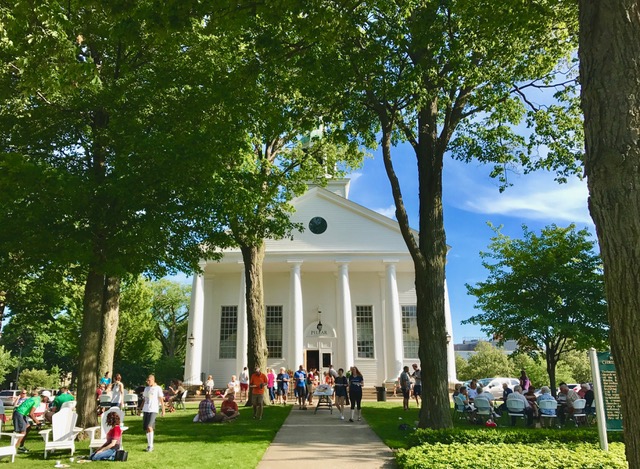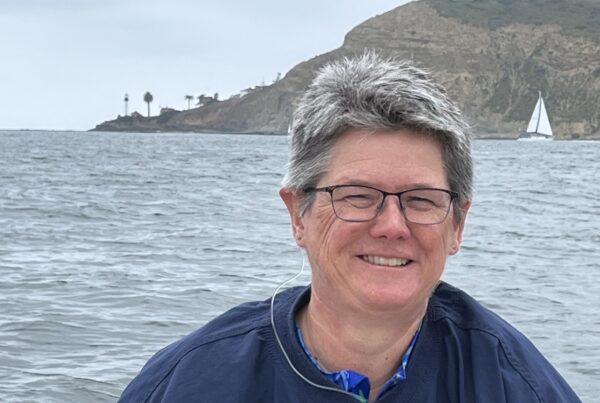“How did you meet?”
“We were introduced by a mutual friend who said, ‘You’re both in a season of transition, both trying to figure out who you are and who you’re going to be in a new chapter of life. I wonder if it might be a good fit.’ He was right.”
And so it was that I met my church.
At the time of my first visit, Pillar Church was reimagining its future. Established in 1847 by Dutch immigrants to Holland, Michigan, the church was the site of an 1884 falling-out that led to the denominational divide between the Reformed Church in America and the Christian Reformed Church. A century and a quarter later, membership had dwindled to a handful of families, and the historic church was dying. Even so, its leaders had a vision for renewal; in 2012 the church was re-established as a dual-affiliation congregation in an effort toward denominational reconciliation.
Meanwhile, I was in the midst of my own reconciliation project; I was working–struggling–to reconcile my belief in a loving God who answers prayers with the reality of my beloved father’s impending death. I was twenty-two; the ink on my college diploma had only just set. I was at the dawn of adulthood, trying on new responsibilities and negotiating fresh independence. I had moved to a new state and started my first job. Seven hundred miles away in Michigan, my dad was dying.
When the distance became too much to bear, I returned to Holland to be with my dad in his final months of life. I was faced with finding faith amidst paralyzing fear, hope in a sea of despair, light in utter darkness. It was at this juncture that I was recommended to check out Pillar and the new thing being done in this old church, to see if it might offer a way in the wilderness, a river in the desert.
I was working–struggling–to reconcile my belief in a loving God who answers prayers with the reality of my beloved father’s impending death.
Transition points are foci of vulnerability, of weakness, of malleability. They are found in the meeting of handle and mug, the binding of page to book, the seam that unites shirt with sleeve. True, we may fall apart at the seams, but more notably, that is where we are held together. It’s where we meet each other in pliable form, available to growth and change. It is in transition that a sonata takes on a new key, that the light of sunrise seeps into the night sky.
At a cross in the road, the way forward is not always clear. When the way forward isn’t clear, we are invited to open ourselves to the vast plains of possibility. When we can’t control the next moment or foresee what the next season will bring, we may discover within ourselves a new willingness to open to the leadings of the Spirit, and the faith to follow in stride. When we are not so securely settled in our steady-state, our gait has the levity to be shifted in flight.
Seasons of transition in the church offer positive disruption, opportunities to entrust ourselves to what God could be doing in our midst. For Pillar, faith in its season of transition meant believing in God’s power to revive what was dying. For me, faith meant believing in God even when there would be no revival, no raising of the dead. And so our faith stories interwove, and Pillar named me as its own. On the days when my life was falling apart at the seams, the church helped hold me together. In the pews of Pillar, among its people, I could live into who I am, for it was there that I was most acutely aware of whose I am: that, as the Heidelberg Catechism says, I “belong–both body and soul, in life and in death–to my faithful Savior, Jesus Christ.”
Today, six years later, I find myself in yet another season of transition, with many parallels to the first. I will soon conclude the last of my twenty-two years of formal education, medical degree in hand. As I approach the transition from student to professional, I face weighty decisions like what specialty training to pursue and where. This season is infused with excitement for what will become of what is now unknown.
Meanwhile, Pillar is also undergoing a period of rapid growth and change. The church that, just a few years ago, considered closing its doors is now bursting at the seams. We’ve relocated to a temporary space while contractors undertake a year-long expansion and renovation project. It seems only fitting that, while Pillar is displaced from its sanctuary, discerning its future in a new space, I am likewise displaced from my house and school, traveling for away rotations and residency interviews, discerning next steps in medicine and in life. The Lord is doing a new thing among us, we perceive.
Faith meant believing in God even when there would be no revival, no raising of the dead.
When I travel, I am often asked, “Where is home for you? Is your family still in Michigan?”
“Well,” I hedge, “My mom moved so I don’t have any blood relatives in Michigan anymore, but Holland is still very much home.” It is home because it is where I am part of a church, part of the Church. Lately, though, I’ve been rethinking my answer. I do, in fact, have blood relatives in Michigan. I have blood relatives of the richest kind: a family of believers bound by the blood of Christ. I have in Pillar a family that welcomes me whenever I return—with warm hugs, coffee dates, offers to host me on holidays, and a table set with an abundance of bread and grapes and grace.
At its best, the church is a family; the sanctuary, a home; its heart, a table.
“Family can be a movable feast. It can be a group of friends
sitting around the dining table for an evening. It can be one or two people
coming to stay with me for a few nights or for a few weekends.
It should be the church.”
—Madeleine L’Engle, Bright Evening Star
Kiri Sunde
Kiri Sunde is a pediatrics resident in Madison, Wisconsin. She has been a member of Pillar Church in Holland, Michigan, since 2012. When she’s not in the hospital, Kiri enjoys biking to the farmers market, road tripping, hammocking, baking bread, riding horses, and snuggling up with her English Setter, Koda, and a good book.



